Let's Dismantle Universal Healthcare in the United States

Obama "care" for the most part has been a disaster. Premiums keep rising & for many, it has become exorbitantly expensive. According to the latest news, steps to repeal Obama"care" has been defeated. Trumpcare as it was proposed would have reduced the cost of healthcare for many. However, let's be logical, the government has no business being in healthcare. The idea of institutionalized, universal health care is ridiculous. Let us return healthcare to individuals. Let individuals pay for THEIR OWN healthcare & totally dismantle Obama"care", never to replace it. Your thoughts. Should healthcare be returned to the individual? The American government has gotten TOO BIG. Healthcare is a personal, not a government concern.Could you provide more details on your plan to "return healthcare to individuals?" How would it be done? The pain would now be enormous. Obamacare could have been fixed very easily but the GOP just refused to do it because of their hate of Obama.
The exchanges already have 10 million + people on them. Since the expansion of Medicaid, more than fifteen million Americans have joined its rolls. If Republicans in many other states hadn't refused to go along with the expansion, this number would be higher.
The real issue are the families and individuals who don't qualify for subsidies. The Federal Govt would have to raise the poverty threshold. A family of 4 making between $90K-$110 per year could pay a lot, up to $1700/mo. That's a lot. The Feds would have to offer higher subsidies to the insurance companies. This would make more companies get into the market.I'm calling BS on the notion that "Obamacare could be easily fixed if the Republicans just......" It's been broken since day 1 and its not a single Republican's fault. It was designed by insurance companies and politicians. The notion that subsidies are required to make it work, show it was flawed from the start.
Calling "BS" is fine. But provide details. Let's see your plan.
Does his failure to have a comprehensive, workable plan mean that ObamaCare is workable? That the country can afford it, that the poor are covered for health care (as opposed to insurance)? Does it mean that young people just starting their first job can afford to pay for seniors with much higher costs? Because RJ doesn't have a plan means all those things?
Calling BS in no way means I have a plan - I never supported a take over of a system that was working OK in the beginning. And even after 7 years there are still millions with no coverage / another fail
I was at a meeting the other night with a self-employed contractor who said his insurance had rocketed up to $25,000 a year for his wife and himself. How in the world can an older person on limited income afford such a plan without subsidies?
The biggest complaints about ACA come from people who don't know anything about the individual insurance market and the enormous prices that insurance companies charge individuals, even small business owners like myself and others.
The CBO now says that simply repealing Obamacare would nearly double premiums.
I for one would cancel my health insurance because I couldn't afford to pay $25,000 to $30,000 a year for health insurance once the repeal (or more likely sabotage) kills the age discrimination limit. I'll take my chances, hide my assets and go bankrupt if necessary.
http://money.cnn.com/2017/07/19/news/ec … l?adkey=bn
Of course it had to get involved. Medical bankruptcies were skyrocketing and driving up premiums and hospital costs. The old system was unsustainable.
Complain about Obamacare as much as you want. At least he did something about the problem, unlike the Republicans, who can't even pass their own bill or do a thing to fix the system on their own.
The incompetent fools can't even come up with enough votes simply to repeal it."The incompetent fools can't even come up with enough votes simply to repeal it."
Perhaps it's because while only a small handful (7% as of the last I heard) of Republicans will vote their minds rather than the party line, not a single Democrat will do so? It's really, really difficult to believe that out of 48 people 100% of them think ObamaCare is not only good for the country but is sustainable.Perhaps there are no Democrats who want to be responsible for tens of thousands of unnecessary deaths every year. Because if you go back to the same arrangement that existed before Obamacare, that is what will happen.
Nice prediction! Not true, of course, or we would have had "tens of thousands of unnecessary deaths" every year in the past as well. But nice prediction, and perhaps you're right - Democrats are stupid enough, or uneducated enough, to believe the drivel. Personally, I don't believe that, but it might be true.
C'mon now, Mr. Apse-the American medical & health care system were fine before Obummler decided to communize health care into the disaster known as Obama"care". The government should STAY OUT of healthcare. Leave healthcare to the individual himself/herself. America is on its way to becoming a nanny state. The government should take care of important issues, not healthcare. The government is becoming too intrusive into the personal lives of others. Let people make THEIR OWN decision as far as healthcare goes.
Sorry, but the US is already a nanny state. The nanny isn't very strong yet, not nearly as robust as those found in Europe, but she's growing fast and gaining strength every day. Americans are being reduced to children, unable to make decisions without the nanny and unable/unwilling to take responsibility for their own lives.
Yes, it's all the fault of the Democrats that the Republicans control the House, Senate and White House and can't pass any legislation.
But it is not Universal Health Care or "Medicaid for Everybody".
Is healthcare a personal and not a government concern? All I know is when that homeless guy with active TB didn't do his medication that he was sequestered and forced to take Rx. Or that Ebola scare in NYC. There is the CDC, so, there is a understanding that government does take the public health as one of it's mandates to protect the country. Now we have Zitka, where cities are spraying for mosquitoes. - You want to end that also?
Public health is one of the greatest things in which a government can invest. Early prevention, which is relatively inexpensive, can prevent dire and expensive health care problems later in life.
Is The Government Responsible For Health Care?
Countries with universal health care include Austria, Belarus, Croatia, Czech Republic, Denmark, Finland, France, Germany, Greece, Iceland, Ireland, Italy, Luxembourg, Malta, Moldova, the Netherlands, Norway, Portugal, Romania, Russia, Serbia, Spain, Sweden, Switzerland, Ukraine, and the United Kingdom.
What is the roles of government in improving health care quality and safety?
Government's responsibility to protect and advance the interests of society includes the delivery of high-quality health care. Because the market alone cannot ensure all Americans access to quality health care, the government must preserve the interests of its citizens by supplementing the market where there are gaps and regulating the market where there is inefficiency or unfairness.
[img]http://www.nesri.org/sites/default/files/uploads/Health-Plane-Jonik.gif[img]
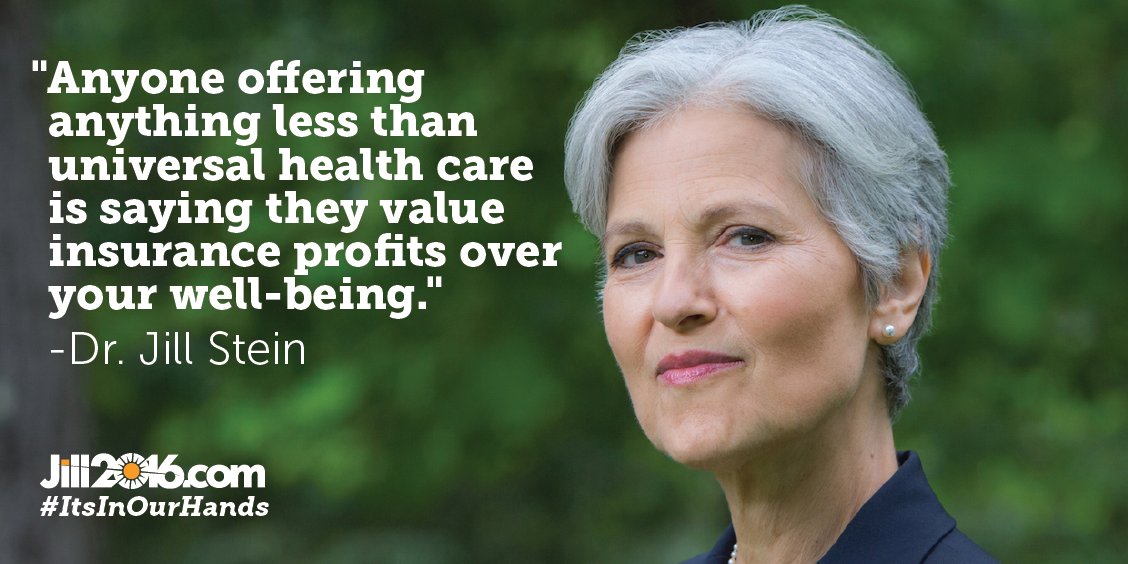
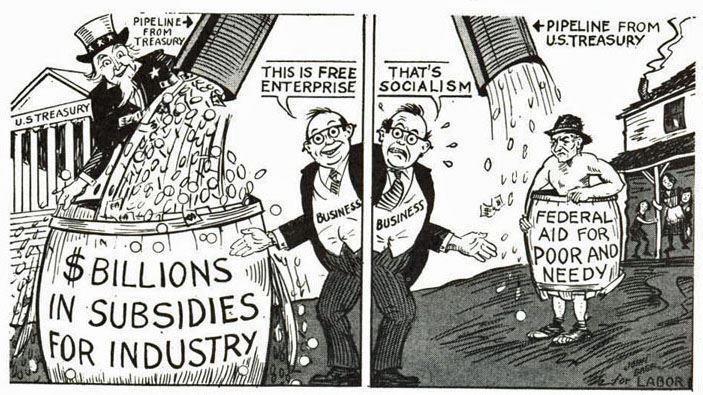
You don't seem to quite understand the difference between the "public" and an "individual".
Yes, we spray for mosquitos...to protect the public. Everyone.
Yes, we sequester sick individuals on occasion...to protect the public, not that individual.
Yes, we have a CDC. which is in place the protect the public...not specific individuals.
We even mandate sewer control...to protect the public, not specific individuals.
But it is up to the specific individual to take of his or her own needs. I am not 300 million people, for the government to protect - I am just one person and expected to care for myself. At least that's the basic conservative premise - the liberal philosophy is that the nanny state IS responsible for each and every individual, in every particular of their lives. Including providing health care for each and every individual just as their parents did when they were too young to do so themselves. Their "parent" has become the government, that's all.
- Will Apseposted 8 years ago
0
There was a debate early in the 2011 primaries when a Republican was asked what happens if a man goes into a coma but has no healthcare.
Here is a snippet:
https://www.youtube.com/watch?v=PepQF7G-It0
The problem for the US right is that a large part of the population have some notion of the Christian idea that life is sacred, and also, of course, the left's notion that in an era of super abundance, avoidable deaths are repugnant. I actually heard a republican point out something I've been saying for some time. Health care costs are ridiculous. He pointed out that back in the fifties and sixties over 40% of health care was paid out of pocket. An average office visit today, for an average 8 minute appointment, is $200; not counting lab work, etc.. He claimed if health care costs were reasonably set we wouldn't be having most of this hooplah we are experiencing. The problem remains that we, as citizens, cannot control those costs. The government cannot, or will not, control those costs.
But, they also pointed out that if we continue with Obamacare, no changes to Medicare, etc. that the effect will be within the next decade costs will equal the entire funds collected through taxation, at the current rate. If that is true, we have to find a solution. We cannot sit on our hands. The problem here is that the government is floundering for solutions which do not address the core problem.+1, particularly that last sentence. The problem isn't where to get the money to pay for health care, it is no make it affordable. And no one seems to want to look into just why costs are so high.
You are right about that Wilderness. I would also add that another core problem is that people are asking "insurance" to do something it was never intended to, nor can it, do.
GAThat's a good point. It's also part of why the cost is so high, whether for "insurance" or for actual care.
We are asking the health insurance companies to quit gouging us. That's not asking too much.
Promisem, a quick look around seems to indicate insurer's profits are coming from areas other than their Obamacare individual plans. Several sources say the Obamacare plans are money losers - even though the companies are making gang-buster profits in other areas of their business.
So, what you are asking is that companies operate a money-losing segment of their business, and support that money-losing segment, with profits from their other business areas - out of the goodness of their hearts.
What other companies do you know that do that? Would you operate your own company that way? As an investor, would you be happy with a company managing your money that way?
GAI don't think the profits are what's at the core of what many healthcare insurance companies show in profits. Many only account for 6% to 8% as their profit margin. Now what they pay their upper management is another thing.
What is funny is that for all the scientific advances and accomplishments this country has come up with there seems that the disconnect with this topic evades any logic.I'm not asking them to support a money-losing segment. I'm asking them to quit gouging us.
Otherwise, how do you propose to fix our absurd health care costs?Hi promisem,
First, you would have to support your accusation that the healthcare insurers are "gouging" us. And yes, that is exactly what you are expecting for-profit healthcare insurers to do.
You would also have to define who the "us" are. I say that because in these healthcare conversations the "us" has typically meant the citizens participating in the ACA individual plans. If the stories that the individual, Obamacare exchange plans are a money losing segment are true, then where are we being gouged?
You question concerning the "fix" is an easier one. I don't think we can fix our healthcare provision problems through private healthcare insurer's products. In the pre-Obamacare period, there may have been things government could have done to make healthcare insurance more affordable, (eliminate interstate restrictions?), but now, the principle aspects of Obamacare-type healthcare provision; no pre-existing conditions restrictions, no caps, and comprehensive plans affordable for all, that the government/citizens are demanding just cannot be provided by a for-profit business model - without the government, (us), subsidizing those insurer's profits. However, that idea was a part of Obamacare that has also failed.
I think there are only two choices. One, go back to the way healthcare insurance was before Obamacare; individual responsibility to get your own coverage, return Medicaid parameters control to the states - with no carrot of enhanced Federal funding, (which means, of course, that all those millions that received Obamacare/expanded medicaid coverage would lose it), and then address the issues, (like interstate competition restrictions, etc.), that might bring down individual plan costs.
Or, two, go to a single-payer national Medicare-type healthcare plan. I don't see a middle ground, a hybrid for-profit company provided solution.
Consider this promisem, without silly metaphors; like asking a Zebra to change its stripes, or a socket wrench to do the job of a crescent wrench, do you think it is reasonable to expect a for-profit business to operate as a non-profit business? Can you see now that the Obamacare premise was asking them to do just that?
I am not making a statement about the ethics or morality of the healthcare insurance industry, I am just pointing out that we, (well, not me), as citizen critics, are making unreasonable demands of them.
GA
Of course we know. The health insurance industry had a 46% increase in profit last year because they bought off Congress, consolidated into a handful of major companies and now practice price collusion as an oligopoly.
promisem, When I looked around at this healthcare insurer's big-profit story I found it to be true, they are making big bucks. But, you should take a look too, and see where those big profits are coming from. I don't think you will find the source of their profits to be the things you attributed them to.
GAYou understand that price collusion is illegal. Why aren't those CEO's in jail? Is it because what they're doing is NOT illegal and therefore not "collusion" (popular word isn't it?)?
- Will Apseposted 8 years ago
0
Anything but deny the obvious truth. Private enterprise, for all its virtues is a bad choice to deliver health care.
Allow doctors to decide who needs treatment, fund it through taxation, and save your country billions. Think how cutting health costs in half would boost industry and investment. And fifty percent of present costs should get you the best health service in the world.
That would require rational thought of a non-ideological kind, but on the plus side you would no longer need to tie yourself in moral or political knots over the issue.What type of healthcare would you suggest, Mr. Apse?
So get rid of Medicaid and Medicare, right? If you want government out of health care, let's make sure it's all privatized. Correct? That's your opinion?
Looks like my comment was deleted. I ask again: if we're dismantling government run health care, doesn't that mean eliminating Medicaid and Medicare?
The problem with health care is the insurance companies. They are a for profit institution. They sit right between the care giver and the patient. It would be nice if we could all pay for our own health care, but what happens when there is a need for more money to pay for very large expenses like a hip replacement or open heart surgery?
All types of insurances are based on a risk reward ratio. The higher the risk, the more they are going to charge for premiums. It doesn't matter if it is car insurance or health insurance. They hope you never need to use your car insurance or your health insurance. Their ideal situation is to just collect the money from your premiums. However from the patients stand point they need insurance for catastrophic situations that they cannot to afford to pay for on their own.
So how do they mitigate the risk and still provide insurance for all? A good example is group insurance in a large company. In this situation everybody is in one pool, the young very healthy and the not so healthy older employees. Everybody pays premiums that are partly subsidized by the company. However the young who do not need the insurance pays for the older employees that need the money for higher risk catastrophic failures. The insurance companies pay for those needs and because of their risk/reward calculations still make a nice profit.
The Affordable Care Act (Obama Care) is a type of group insurance where the young are funding the older people for catastrophic health situations. The individual mandate is way of getting the younger people to participate in the pool. The government acts like a large company that subsidizes the pool so that everybody can be insured. The single payer plan would have allowed that, but Obama had to compromise with the GOP in order to get it passed. .
The reason it is so difficult to repeal and replace it is because it is not a 19 page insurance policy, but a body of laws, procedures, and policies that govern every aspect of health care, including regulating the insurance companies profits. That is why it is over 2,000 pages and not 19 pages like the GOP plan. However it does have its short comings and needs to be fixed. But in my book, repeal and replacement is out of the question. You can call it what you like, socialized medicine, nanny state, or whatever. But if it is disaster and job killer and is imploding, why has it lasted for 7.5 years without any of those claims occurring?"The government acts like a large company that subsidizes the pool so that everybody can be insured."
Not quite; Very few companies (can't think of any at all) will insure people that do not produce something of value for the company. The government, on the other hand, subsidizes ONLY those that produce nothing.She said "acts like a company". A govt is nonprofit. Govt subsidizes your company via tax breaks so your premiums are lower. Everybody gets subsidized including you.
This concept that not taking so much from your pocket is a "subsidy" continues to baffle me. Especially as it continues to be more than others are forced to cough up and, in the case or corporate taxes, is generally a method of government "buying" what they want to see the company do.
Can you expand on that concept, explaining it a little better?
Wilderness; When you work for a company that has group insurance, more than likely part of your premium is paid for by the company. In other words they subsidize it.
The government is not a profit center; therefore it gets its revenue from taxes. The government, as far as I know, per se does not create anything that directly adds to the GDP. They provide services and government contracts, but they are not part of the GDP. Therefore the subsidizes that they dole out have to come from taxes from you and me and everybody who is in the pool.
The ACA is like a company group insurance, the younger healthier people are paying premiums as well as the not so healthy older people. The money from the younger people is used to pay for serious and costly medical services for the older people. In order for the ACA to cover as many people as possible, there is an individual mandate to make sure everybody is in the pool. In many cases, they younger people who cannot afford the premiums are subsidized by both the state and federal government, by the taxes and premiums we pay.
My daughter is a case in point. She is 45 years old, self-employed and is caught right in the middle of the individual mandate. She is not able to afford the premiums on her own. Therefore, the state and federal government subsidizes her premiums. If they did not do that, she would not have health insurance.
The money from her premiums are then re-distributed to pay for your hip replacement and open heart surgery. You can call it socialized medicine or the nanny state, but that is how it works. So yes the government is acting like a company group insurance that subsidizes those who cannot afford it. And yes the money comes out of your pocket and mine so that you and I can have hip replacements and open heart surgery. How can you afford to pay for those serious health issues on your own?Yes, employers pay for some of your insurance; it is a part of your "contract" with them to do so in return for whatever your labor is producing.
Yes, government takes from one person to give it to another, with nothing in return to either the government or the original owner of the funds.
And your point is?"Yes, government takes from one person to give it to another, with nothing in return to either the government or the original owner of the funds."
"nothing in return" is a deferred payment when it is needed at a time in the future.
If it were as you state no insurance would ever work as the payout would always be greater than the returns. The only way insurance works is by reducing risk and or more recently denying claims. Reducing risk is getting those in good health who will not draw claims until they have paid well into the time frame.
To make it work you have to draw from the biggest pool of lower risk participants that you can possibly assemble. In the case of health care it would be the young who don't start accruing doctors bills more than likely until their late thirties to early forties. Allowing people to avoid being in the pool by applying a penalty that is less than the premium that would have been due defeats the whole process.Pulling money from Medicare to make up for it was always going to fail as it just was not how Medicare was designed.
If you want people to be responsible for their own medical costs through some type of insurance than you make them financially responsible just as with Social Security where it is a payroll tax where all are liable.
It is very simple until you get the lobbyists and politics let loose.
Reading these comments I am once again reminded how very fortunate I am to live in the UK. Healthcare here is free at the point of delivery. Yes, our health service creaks along, and isn't always perfect, but at least we are not at the mercy of the insurance companies.
Wilderness: What is your point? If you don't see my point and others who are trying to explain it to you, then this has become an exercise in futility. I'm sure you understand this, but you are keeping a closed mind.
For some conservatives, the concept of saving money by providing health care for everyone is so against their "survival of the fittest" mentality, that the facts are overlooked or denied.
And some liberals don't understand the difference between spending and saving.
That's life, isn't it?No it doesn't. Perhaps it could start with a refusal to use inflammatory, nonsense statements about other people.
If you're referring to this; I stand by my statement: "For some conservatives, the concept of saving money by providing health care for everyone is so against their "survival of the fittest" mentality, that the facts are overlooked or denied."
Sometimes the truth hurts. You may or may not be one of these conservatives, but they do exist and the statement is factual. Some liberals also engage in the same type of intellectual acrobatics to avoid upsetting their carefully cultivated belief systems. The anti-vaxers come to mind.I'm sure you're right - some conservatives believe in survival of the fittest and would allow the elderly, the infirm and children to die for lack of sustenance. You might even find 100 in the country - more if you would specify a particular race to allow to die.
But they are a tiny, tiny minority and not worthy of mention. Fewer even than the anti-vaxers. So why bring them into a conversation if not to at least put a thin coat of the same paint on all conservatives?I don't think they are a tiny minority. I suspect my definition of what constitutes a survival-of-the-fittest mentality is different from yours. Remember, Paul Ryan, an elected conservative leader, is an Ayn Rand follower.
Holy cow Batman! An Ayn Rand follower! Exile the bugger!
PrettyPanther, you must understand that in the context of this discussion, and your comments, that "Ayn Rand" snark can only be interpreted as a negative inference.
I took a quick look at the foundation of her perspective, (not the groupspeak you hear in social circles), and here are the corner stones that you apparently see as negative qualities:
- Follow reason, not whims or faith.
- Work hard to achieve a life of purpose and productiveness.
- Earn genuine self-esteem.
- Pursue your own happiness as your highest moral aim.
- Prosper by treating others as individuals, trading value for value.
I am also an advocate of those basic concepts. Would you care to point out the evil in them? Especially as they relate to an "elected" leader.
Without resorting to talking points or examples of the extreme of course.
ps. Damn! from Hitler to Ayn Rand, you just have a bag full of profundities to draw on don't you.
GAHoly cow back at ya. I read all of her books including the notorious Virtue of Selfishness, widely dismissed by reputable philosophers for its warped focus on egoism, attacks on altruism, etc.
It's the moral foundation of the equally notorious Koch brothers and similar billionaire Liberatians who oppose Medicare, Social Security and other social safety nets as well as fund the Tea Party, Freedom Caucus and other destructive political elements that have arisen in recent years. Thank those sociopaths for the chaos we have today.
Evil? Maybe not in the same way as Hitler. Bad for America? Absolutely.
Speaking of Libertarian politicians and their obsession with the self over all other concerns, let's also not forget that Rand Paul was named after Ayn Rand. Just a tidbit to ponder.Thank you. I am on the road right now and don't have time to properly reply to GA. The only thing I will quickly add is that Ayn Rand was a despicable human being, which is not surprising given her despicable "philosophy."
I can wait Prettypanther, but I couldn't resist making this meme for you...
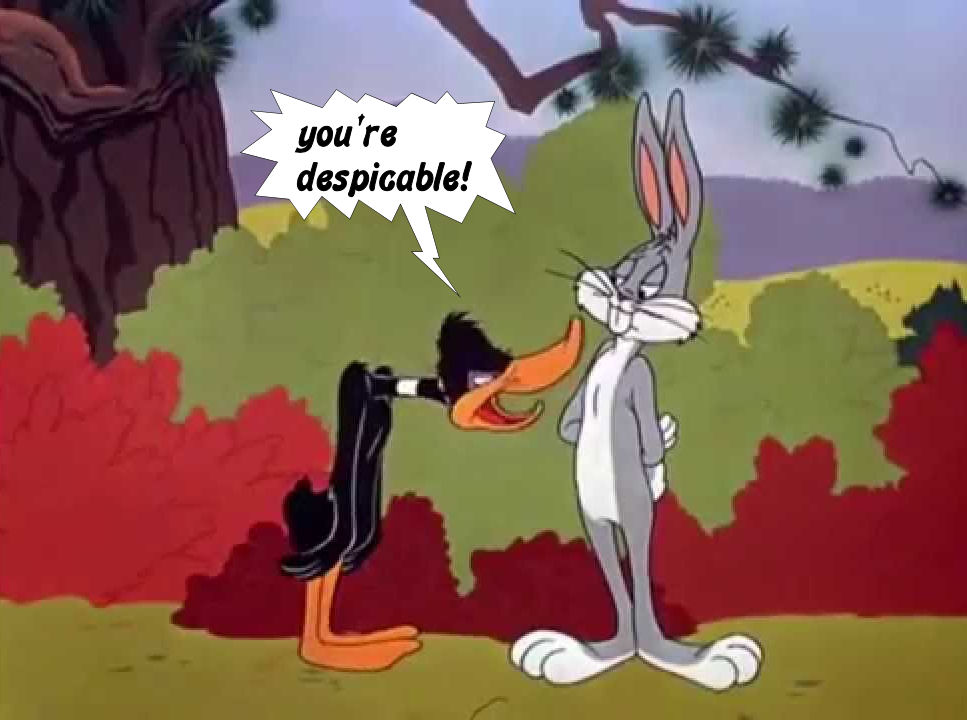
ps. you know I am not a meme fan, so that tells you how strong the temptation was. Alas, I am just a weak human.
GALong after her death, she is having a greater impact on America today than when she was alive. Her devotees have acquired a lot of wealth and political power.
Well, promisem, let's back up a step and establish just what it is we appear to disagree on.
How about addressing those listed statements that are the foundation of Objectivism first, then we can proceed to the examples you mentioned.
Here they are again:
- Follow reason, not whims or faith.
- Work hard to achieve a life of purpose and productiveness.
- Earn genuine self-esteem.
- Pursue your own happiness as your highest moral aim.
- Prosper by treating others as individuals, trading value for value.
Which of these do you think are "bad for America?"
ps. I stopped after Atlas Shrugged and The Fountainhead, I was reading for pleasure, not philosophical education. Also, although I do advocate those basic concepts listed, I do not support the house of Objectivism built on that foundation.
GASure thing, GA. I agree with them in a limited context. But there is a notable absense of "other", except for #5, which still treats other as an object. The lack of other is what I believe leads to "bad for America".
Thanks for the clarification in your final paragraph. I did find her work interesting and thought provoking. She especially seems to have appeal for younger people who are just discovering their sense of self.It appears then, that your "Ayn Rand" negativity is with the way some apply the principles of Objectivism, not the principles themselves. Isn't that true of all philosophies? Even Mother Teresa had her criticisms and detractors. For every "Koch Brothers" bogeyman there is a Soros bogeyman.
I think you are stretching with your determination that the fifth statement advocates treating "others" as objects. It clearly states "individuals," the same entity a believer is determined to be viewed as. Reads like, "treat others as you want to be treated" to me. I bet it was the "trade value for value" that gave you that thought.
Speaking of "others," and your mention of the lack of it... I think that is the mantra Objectivism trashes. "Self-sacrifice, the needs of others before your own, the eminence of 'your brother's needs* over yourself, etc." Charity and all those others are great things only if they are a choice. And altruism is not even altruism without choice. *societal "brother," not familial "brother"
Is there sanity in the concept of beggaring yourself for the uplifting of another - without choice?
You are right, there is a lack of "other" in those principles, but I think it is because those principles advocate a greater benefit of charity and self-sacrifice, and, individual responsibility and accomplishment, when they are choices and not obligations.
GAGA, it's actually both. My negativity relates to the limitations of Objectivism on the importance of altruism or "other". This limit shows up in the actions of people like the Koch brothers. FYI, we can have a separate conversation on the difference between the actual Koch brothers and the imagined Soros based entirely on how they really spend their money.
Just to be clear, I don't believe in "beggaring myself" for others. I think all social relationships are about finding a health balance between self and other. I'll never beggar myself to my wife no matter how much she scares me.
You are right about the trade thought. It's a little too objectivist for me.
You are right promisem, a Koch Brothers vs. Soros conversation would need its own thread.
And since it's not a martini night, a philosophical discussion of Objectivism doesn't seem worth the lift. I think we can leave it that I don't see an Ayn Rand reference as the negative it is too often taken to be. And you do.
As for the Altruism thing, I don't know for sure, but I bet that if investigated, it would be found that Objectivism doesn't condemn altruism as a choice, but as a perceived moral obligation, or act of a 'superior' human being. I think its intention is to condemn the social expectation of such obligations; altruism, self-sacrifice, charity, as natural and moral expectations..
But, you did open another avenue... Why do you see interactions portrayed as one individual to another, and, as equal benefits of value for value, (a win-win?), as a negative "Objectivism" thing?
GAI still see interactions in the form of "value" as another limitation of Objectivism and, in keeping with its name, it makes another person only an object and not a subject.
As an object, my wife has value for her contributions to the family. It is my rational judgment of her. As a subject, she provides love, joy, warmth, etc., which is my emotional judgment of her.
An object is a thing that I use for my benefit in exchange for a benefit I give. A subject is a person I embrace or reject on many emotional and sensational levels.
Geez, you have more mental energy than I do. Please make tonight a martini night, drink a few and ask me easier questions.
When two people agree to exchange "value for value", which one is designated as the object, and why not the other?
If you buy a loaf of bread from the corner grocer, is that grocer an object? Or are you?
If you exchange the fruits of your labor for dollars, are you the object or the employer? Why?It's too early for martinis promisem, but this should be easier because I think you are just trying, (and still struggling), to play word games with the concept of "individual. Now wait, I don't mean that "word games" description as harsh criticism, just that I think you are trying to hold on to a thought that reason tells you to let go of - but which your premise demands for validity.
Using your own wifely example, I can reasonably, (at least I think so), challenge that her love and warmth are values, just as her contributions to the family are. And that you equally return those love and warmth values. Value for value. Win - Win. Between individuals.
It is easily viewed that the exchange of "love and warmth" are equal values - apples vs. apples. I think that the family contribution values, even though appearing to be apples and oranges, are also equal values.
A crude example is that she cleans house, and you bring in the paycheck. She is happy with her contribution, (exchange), and yours, and you are happy with your contribution - in exchange for hers. Value for value. Win - Win. Between individuals.
No "subject" or "object" delineations. Just two individuals 'trading' with each other for each one's, (and the other's too), happiness.
Come on promisem, without the connection to Objectivism, and considering that "value" isn't restricted to money, (both of which you appear to see as a taint), do you really see a problem with individuals interacting with others, also as individuals, and, doing so with the creed that the interaction should involve "value for value" standards?
ps. maybe you shouldn't let your wife see your last comment. Telling her that you see her as an object for the things she does for the family might not be a wise move. Especially if the laundry and dinner aren't done yet.
pss. I don't think I ask hard questions, I just think some of my questions make some folks work harder to justify maintaining a position. ;-)
GAOK, I grant that I value her love. Do I limit my view of her love strictly in terms of value? Do I give her love only when she gives me love? Joy for joy?
From that point of view, an exchange of value for value is simply a transaction. It ignores what many people (that I have read) found wrong with Objectivism, which is the transactional approach to self that negates altruism. With due respect, you yourself referred to it as "trading".
As you know, Christianity calls for unconditional love. Buddhism emphasizes compassion. I don't remember finding unconditional giving of any type in Objectivism. Just what is good for the self.
I don't see money as a taint. I just see it as one trait of an economic relationship.Stop dancing promisem. The terminology isn't restrictive. Give or giving could just as easily substitute for trade or trading, or transacting. All describe an act of exchange. And that is the core point of that Objectivism tenant of the discussion.
Here is a perspective, once again, using your "wifely" example. What if the more important value you receive in exchange for giving her your love and warmth, isn't her love and warmth, but your own happiness from doing something good because you know how important your love and warmth are to her? Would that make you selfish? Isn't that still an exchange of value for value?
Bearing in mind that the transaction/trade/giving is advocated as "value for value," here is another example that might be more relative to your objections. If you give a shoeless homeless man a pair of shoes, and it makes you feel good to do so, isn't that a trade of value for value - his gratitude for a fulfilled need on one side, and your happiness from the feeling of doing a good deed for someone on the other?
However, I'm sure that if that homeless man had spit in your face and took off with your shoes, you certainly wouldn't feel it was a value for value exchange.
I think that most of those objecting, (or despising), the ideas of Ayn Rand are really objecting to having their view of societal morality challenged. I left religion out of this discussion, but, since you brought it in, I think religious beliefs and teachings are the cause of this backlash. From birth we are taught that it is our purpose and obligation to do good for others. Often at our own expense. I think those actions should be choices, not moral obligations
GA
In your mention of "altruism," you have keyed on exactly why Objectivism is such an ugly philosophy. I believe you are right that Objectivism does not condemn altruism as a choice, but does condemn the concept of moral obligation to "help" another human being. According to Rand, our highest moral purpose is to purse our own self-interest and happiness. We have no moral duty to sacrifice ourselves for someone else or for to have someone else sacrifice for us. [Aside: recognize this statement from anyone here on Hubpages?)
In all societies, a substantial number of individuals are not capable of looking after their own self interest. Children, some elderly people, the mentally disabled--these are just some people who are not able to rationally pursue their own self-interest which, according to Rand, is what every individual must do. In order for these people to survive, they require others to sacrifice their own personal desires, sometimes to the degradation of their own self-interest.
The way I understand it (as has been explained to me by a friend of mine who is a Rand worshipper) an Objectivist addresses this issue by saying some people will take care of the "subnormal" (Rand's term) because it makes them happy to do so. However, the Objectivist philosophy cannot say that the subnormal deserve to be taken care of, or are owed anything at all, simply because they are human beings. This is exactly why Rand's philosophy is despicable, because if these people don't merit being taken care of or helped, then they don't merit being alive, because if they cannot take care of themselves, and no one "wants" to take care of them, then according to Rand, they should simply die. This is just one step away from saying they deserve to be killed.
I probably haven't explained it very well, but I believe this is the main reason philosophers discount Rand, because she claims altruism should be a choice, not a moral obligation. And, she also claims that everyone should pursue their own self-interest. However, if my self-interest conflicts with your self-interest (i.e., I want that piece of land; you already own it; I'll take it from you), then something has to happen to prevent me from stealing your land. That is why Rand introduces "rights," i.e., the right to property, the right not to be killed, etc. The flip side of "rights" is "duties," i.e., the duty not to take someone else's property, the duty not to take someone else's life. However, any introduction of rights requires the introduction of altruism. After all, why do I have a right not to be killed? You and I only have rights and duties only if we have an obligation to care for each other, but if we have such an obligation, then altruism is back on the table. Yet, Rand claims altruism should be a choice. Do you see how it doesn't make sense?
Well, I took a stab at it. I'm not sure I did a very good job, but my main point is that Rand's philosophy discourages altruism for the sake of altruism, and treats the helpless (babies) and the weak (mentally ill, disabled, elderly) as not worthy of moral obligations. It is an ugly philosophy pushed by an ugly human being.
Last comment. There is a reason this philosophy appeals to teenagers. Their brains are not yet developed. Their intellectual and moral faculties are not yet fully formed. It is my opinion that if a full-grown man or woman still thinks Atlas Shrugged is a profound literary and philosophical achievement, they are intellectually and morally stunted. Yeah, that's derogatory and I mean it that way.
SandyThe bottom line is this: Moral obligation should not be thrown to the GOVERNMENT.
Government is not a sentient being, so it has no morals, much less obligations. The people who choose their government, however, at least in this country, can decide their priorities via their vote. Since you voted for Trump, I assume you prioritize building a wall over health care for pregnant women, for example.
You are just being negative. I do not deal with negative.
This brings out another burning question. It doesn't take an intellectual genius to figure out that we cannot provide ALL the needs of everyone, and certainly not all their wants. Resources are not unlimited. And that means that where we put those resources must be prioritized.
We could, for instance, decrease military spending to zero, freeing up a large sum for providing for the needy. Personally, I doubt the country would outlast the decade before China, Russia, N. Korea or ISIS marched in and destroyed what resources we have. Or we could throw open our southern border, supporting anyone that could walk in, with the result we already see; a great many of those limited resources flow into foreign countries and/or their citizens.
So what would your priority be; provide health care for pregnant women or spend it to stop the influx of illegal aliens and next year provide health care for pregnant women and children? What would you give up to have both now, and what would the cost be tomorrow? Right now we are borrowing staggering amounts of our future to provide for today's people - what will we do when that cost comes due?You make a good point...
Without the numbers.
4% USA military spending can solve world hunger. Don't bother with the denial retort. Don't like my numbers? Prove me wrong...with links please.
It is unquestionable that US mil spending is many times higher than 10 top mil in the world COMBINED. Defend a single 500 bil bomb that can be used instead on social programs that benefit the greater good."4% USA military spending can solve world hunger. Don't bother with the denial retort. Don't like my numbers? Prove me wrong...with links please."
You don't seem to have learned that one must question and investigate ridiculous claims, so I'll do it for you.
Military budget is about 250B per year. There are about 1B people going hungry. That should be enough to show just how ridiculous the claim is, but I'll go ahead and do the math for you:
520B*4% = 21B. 21B/1B = $21 per hungry person, per year. Even a radical liberal, slavering to "prove" that 4% of the budget can feed the world's hungry, cannot possibly believe that $21 per year per person will do the job; it won't even buy the transportation, let alone the food itself. Not even if the entire budget were devoted to it; that's still only $520 per person.
And don't forget that if we take all the military spending, that leaves over 2M Americans (just members of the military, ignoring the millions that earn their food by working to provide the hardware for that military) without an income; if each income supports just 2 people, that's another 4M going hungry.
Here are your links requested:
http://www.marxist.com/why-are-so-many- … hungry.htm
https://en.wikipedia.org/wiki/Military_ … ted_States
http://www.npr.org/2011/07/03/137536111 … s-military
But US military spendng is "many times higher than 10 top mil in the world COMBINED"? Given that the first one is SO far off from reality, lets check that one, too:
US military spending, per year: 611B
Next 10 countries, added together:659
Seems that the US doesn't even equal the next 10, let alone be "may times higher". Where in the world do you get your "information"? Just make it up according to what you wish were true?
https://en.wikipedia.org/wiki/List_of_c … penditures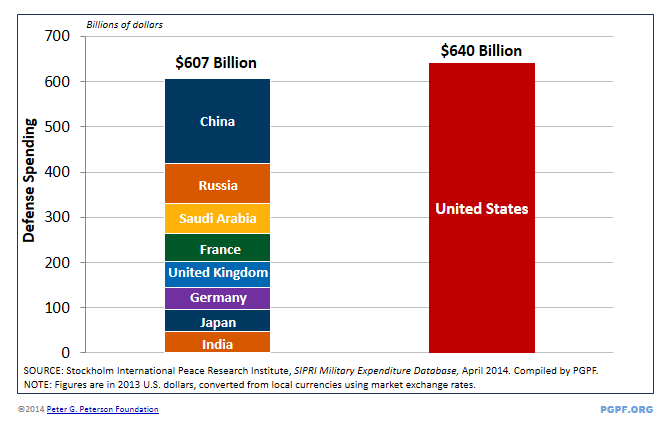

{But US military spendng is "many times higher than 10 top mil in the world COMBINED"? }- I meant to say that the USA military budget is bigger than the 10 ten mil in the world combined & that is is many times larger than any single country. My mistake, I'll admit it.
$603 billion (£467 billion) this year for the US. - http://www.businessinsider.com/12-count … 1-of-gdp-1
Billion starving people is about right it's around 842 million or 13% total world population.
"A common, often altruistic, theme amongst many is to be able to solve world hunger via some method that may produce more food. However, often missed is the relationship between poverty and hunger. Hunger is an effect of poverty and poverty is largely a political issue." - http://www.globalissues.org/article/8/s … ld-poverty
http://www.usgovernmentspending.com/chart_wizard.php
According to the chart above it appears to be 800B estimated nominal budget for the USA military budget for 2016.
"A Stockholm think tank estimates that a mere 10 percent of money the world spends on its militaries [sic], every year would be enough to end global poverty and hunger in 15 years." -
Chad, North Africa: The Aboubakar family from Darfur, Sudan, spend £37 a week on food to feed six people. £6/person for a week or around $9/week/person. £1 = $1.30
Using your references:
http://www.marxist.com/why-are-so-many- … hungry.htm
1 billion people in the world subsisting on $1 a day or less.
https://en.wikipedia.org/wiki/Military_ … ted_States
637B for 2015 US Budget
http://www.npr.org/2011/07/03/137536111 … s-military
This link has zero info on $$$$
https://en.wikipedia.org/wiki/List_of_c … penditures
611.2B for 2015 US Mil Budget
None of these links gives the same numbers that you have used:
"Military budget is about 250B per year."
I think that was a typo because later you wrote:
"520B*4% = 21B. 21B/1B = $21 per hungry person, per year.
None of the numbers you gave match the info in the reference links. I've learned something from you today. Always question numbers!
I believe the whole point of this something we can agree on: Don't just give food, have policies that allow people to feed themselves. Isn't that the whole point of having an 'ideal' government? Sometimes these policies take time and people can't 'wait it out" - they are dying of starvation -so we give as a stop gap measure. That's why an individual can make a difference working with charities giving time, energy and dedication to make the world a slightly better place to live in.
People develop governments to ensure order in society and to protect its citizens. To create policies that create a sustainable economic development and to the health and safety of it's people. The Government is supposed to work for us, not the people working for the Gov't.
A Good Read (or audiobook!):
Why Nations Fail. Why Nations Fail: The Origins of Power, Prosperity, and Poverty, first published in 2012, is a non-fiction book by Turkish-American economist Daron AcemogluYes, it was a typo. They were ALL the 250B figure until I realized the error (transposed two figures) and corrected it. Guess I missed one.
The one link was to indicate the number of people that removing the US military budget would add to the number of hungry; those people employed by the military. Of course, the number would be far higher (3X? 10X?) if ALL the people depending on military spending were included.
So we have at least three different "estimates" of military spending. Can't see it matters which is right - they all say pretty much the same thing; the US is the world's police force and the world spends a lot of money on defense (and offense ) But it is kind of funny that you've gone from fixing world hunger with 4% of the budget to fixing it in 15 years with 10% of the world's budget. And even that is not possible; consider that as we begin fixing hunger the population goes up, making more hunger. I doubt your Swedish think tank considered that!
) But it is kind of funny that you've gone from fixing world hunger with 4% of the budget to fixing it in 15 years with 10% of the world's budget. And even that is not possible; consider that as we begin fixing hunger the population goes up, making more hunger. I doubt your Swedish think tank considered that!
And at the bottom is that all the money in the world isn't going to end it because it is political, not financial or, in most cases, even cultural. We could put 100B a year into Nigeria, or any of many other African or South American countries, and not produce one speck of ability to feed the people there. IMO that think tank is dreaming the impossible dream; one cannot force self sufficiency onto a nation that insists on too many children, too much politics and too little willingness to change.
We can't even end hunger in the US as long as the only method used is to throw money at it!Is it culture, the weather, geography? Perhaps ignorance of what the right policies are? Nope. Man-made political and economic institutions that underlie economic success (or the lack of it) is what the book 'Why Nations Fail'.
1st chapter: Nogales, Arizona, and Nogales, Sonora, have the same people, culture, and geography. Why is one rich and one poor?
The main thesis that the authors put forward is fairly straightforward. First of all the state must be sufficiently centralized that its rulers and ruling elite can actually govern it. The second is that Economic and Political institutions established in the state are inclusive enough that a significant portion of the population have significant powers to prevent the control by a narrow elite, and that the state is governed by the rule of law in which the rights of all – justice, property, education, economic and political - are adequately protected and are difficult to be removed.
'Rule of Law' for me is supreme for justice is one of the most important values a society can have. In order to have justice, must have freedom of speech.
Sandy, you did a good job describing Ayn Rand's perspective, and I agree with almost all of it. But, Oh my , I just posted another response that sets me dead center in your sights. I can only hope you have followed my exchanges with promisem to see the parameters of my support for the foundation of Objectivism, and my support for her philosophy.
It was at the point of "sub-humans" that my support for both stopped. Sort of like my belief that the Ten Commandments would be a wonderful guide to living a good life - if you could leave out 1, 3, and 4.
Although some will argue they mean the same, I like your choice of "duty" over "obligation." I think it describes my perspective. I support Rand's perspective that no one has a right to place an obligation on someone to live their life for the benefit of another. But I also agree with your description of that same demand as a duty - a duty of living in a society, Because assuming a duty is a choice. If I don't want to do that, then I have the choice of not living in a society. An obligation, on the other hand, is placed regardless of my choice to live in a society or not.
Still, there are other points in your comment that that don't reflect well on me - from your perspective. For instance; I too think that being human means you do deserve a chance at life, but that is about it as an obligation goes. I would not take that thought to the point where someone else must sacrifice their life, (whether literally or figuratively), for another human - unless it was their choice.
If such a person were a family member, I would choose to assume the duty to do so, but if it were an equally good person stranger - I may or may not make the same choice, but I am certain I would resist the obligation to do so.
You seem to rely heavily on the concept of moral obligations as a barometer of a good person, but there is danger in that perspective. I don't mean to start a tangent, but would assisted suicide be an example of the dangers of assuming moral obligations? If so, which one; the one that respects a peaceful and respectful inevitable death, or the one that says no life can be taken no matter how horribly intolerable, (as in pain and suffering), that life, and inevitable death, may now be?
I just cannot agree that altruism, self-sacrifice, and charity are moral obligations. For a moral society they must be choices.
As a final note, my support of Ayn Rand is the support of her Atlas Shrugged and The Fountainhead observations, (I think we can see the truth of them in today's society), not her complete philosophy of Objectivism.
GA
Wilderness: Do you have car insurance and homeowners insurance? Or do do you save enough money to pay out of pocket when there huge catastrophic costs involved?
I have insurance. A purely optional decision that I spent my own money on, not someone else's.
What does that have to do with taking from one person in order to give it to someone else? Are you trying to insinuate that forcing me to buy insurance (or care) for someone else is equivalent to an MY decision to join a group of similar risk people for car insurance?
Wilderness: When you pay your insurance premiums with your own money, where do you think that money goes? Do you think it goes into a fund that is just for you, so that you can use it when you file a claim? No it goes into a pool where part of it goes to the insurance company for profit and part of goes to pay for high risk high cost claims.
Whether you like it or not, you are in the pool with everybody else. Do you think what you pay for premiums is enough money to pay for your hip replacement or open heart surgery, or chemotherapy treatments if you had cancer?
If you are in a car accident, do you think that what you pay in premiums is enough to pay for damages to your car or your injuries? If you have severe water damage in your house, do you think your premiums are enough to pay for the restoration of your house?
To answer your question, when you buy insurance, it does not put you in a pool of "similar risk people." It puts you in a pool of low risk people and high risk people. If you never file a claim, that means the insurance company has used your money along with everyone else's to pay off someone else's claim.Yes, yes. In understand how insurance works.
No it goes into a pool where part of it goes to the insurance company for profit and part of goes to pay for high risk high cost claims. "
Actually, no. If all the statistics are perfect indicators of reality (they never are) my money goes towards paying claims for those of similar risk. High, low or medium. If I'm low risk, I'm not paying premiums designed to cover the costs of high risk drivers. Car insurance ins not ObamaCare, where low risk drivers are intended to cover costs of high risk drivers and using tax receipts to cover costs premiums cannot.
In other words, premium is commensurate with risk, where ObamaCare does not make that connection. Instead it does the opposite, intentionally forcing low risk people to pay higher costs in order to lower costs for high risk people and using taxes ("premiums" not designated as such) in addition.
And finally, auto insurance is a choice...something ObamaCare is not and something you completely gloss over and forget to mention at all. It is also a matter of people paying their own premiums, premiums based on risk. ObamaCare is not - the root of it is to pay premiums from the pockets of someone else. Share the wealth, in other words, and that is something car insurance does NOT attempt.
Why healthcare costs so much? Maybe this is part of the answer:
The pharmaceutical industry’s lobbying efforts topped $231 million last year; indeed, the industry has spent more on lobbying than any other industry since 1998. The industry retained 894 lobbyists to influence the 535 members of Congress.
Medicare Part D is a voluntary insurance program for prescription drugs for people on Medicare. Why doesn't the government use its vast purchasing power to negotiate better deals? Although the insurance plans can negotiate prices with drug makers, the government cannot. Americans pay the highest prices in the world for prescription drugs.
Part D pays 80 percent more for medicines than the VHA and 73 percent more than Medicaid.
We live in a Corporatocracy, like the great European monarchies of yore: They have the power to control the rules under which they function and to direct the allocation of public resources.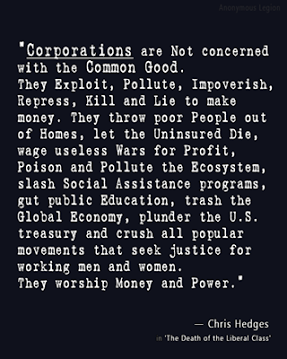
"Why doesn't the government use its vast purchasing power to negotiate better deals?"
Not sure I'm comfortable with this (notice that "not sure" does not mean agreement and does not mean disagreement). Consider the "negotiation" over ACA plans, when we see insurance companies pulling out. Do we really want that big of a "fist" at the negotiating table? What happens to quality when price is too low to sustain good practices? Just not sure of this at all - it sounds good and reasonable, free market in practice, but when the buyer is that large....
Wilderness: O.K. All insurance companies are based on a risk reward ratio. They have to calculate what their reward profit is going to be based on the amount of risk they are insuring.
The government as far as I know is not a for profit institution. In fact we are a debtor nation. Just look at the national debt and the budget deficit. The only way they can afford to provide health insurance for as many people as possible is to have everybody in the pool to provide the revenue to cover the cost of claims.
They can do this in two ways: One is with the individual mandate and the other is with a single payer system. The governments "business model" is based on income (revenue) versus outgo. For the annual budget, if there is more income than out go, that is called a budget surplus. If there is less income than outgo, that is called a budget deficit. If there is a deficit, that debt is added to the national debt. The national debt has always been a deficit. Therefore where is the money going to come from to pay for health insurance, but from taxes and premiums.
I suppose you would rather choose your own insurance company and use the free market model with no regulations, where the insurance company is free to gouge you to the point where you can't afford insurance and it is all based on their selfish profit motive.
Free market enterprise in theory is supposed to be self-correcting, but in my view it doesn't work for the little guy where the insurance company becomes the "money changer" between the care giver and the patient. I believe you are looking at this from your individual view point, not from promoting the general welfare for the greater good of the country."The governments "business model" is based on income (revenue) versus outgo."
Disagree. The governments "business model" is to spend whatever it wants to, then raise taxes and borrow enough to cover what is spent. The primary purpose is to maintain power for politicians and parties, not to provide what the country needs.
"...where the insurance company is free to gouge you to the point where you can't afford insurance and it is all based on their selfish profit motive. "
First, the free market has always been superior to a committee setting prices. If you don't like the price, go elsewhere; if "elsewhere" charges the same either don't buy or shut up and spend what is necessary to get what you want. But don't decide to steal from others to get what you want but don't want to pay for. As far as being selfish; isn't it just as selfish (or more so) to demand what you refuse to pay for? To simply take whatever it is you want from the pockets of people that have worked hard to get it?
"I believe you are looking at this from your individual view point, not from promoting the general welfare for the greater good of the country."
True, to a point. But neither are YOU considering the general welfare OR the greater good of the country. Both are submerged in an effort to provide for individuals at any cost and without regard to the long term good of the country or general welfare.And how low will premiums go when we allow the insurance companies to compete nation wide without restricting the free market to each state??? All we ever had to do was lift that stipulation.
I'm sure SOME people knew the effects of that! (... as in insurance company owners?)
Wilderness: I just thought of something. My wife and I are both retired and have medicare with the supplement program. The premium is automatically paid out of our social security $104.00 per month for each of us.
We pay zero for our prescriptions and office co-pay. We get decent care with our service providers and are generally happy. This also includes an once a year eye exams and glasses.
But I bet you on the other hand are generally miserable thinking someone or some institution is going to steal your hard earned money and encroach on your territory. I'm betting you live in the wilderness. Hence the name Wilderness. I understand. It is typical of conservatives to protect their domain from others. It is a matter of survival for them. It's the I got mine, you go get yours and stay away from mine mentality.… bragging much? wilderness never does that. He doesn't need to.
Sorry, but I"m on the exact same plans...the plans that I've been pre-paying for the last 40 years. Or did you forget that tiny part?
But it's interesting that you mention medicare, for it is far closer to an insurance program than ObamaCare ever was. Barring the disabled, everyone has paid their own way. The risk pool is about all the same - elderly people over 65 years of age.
But you're semi-right in the "wilderness" part - my home, although suburban, is as far from California, NYC or any other metropolitan are as you can get, philosophically. People really ARE different here, but until you've lived in such an area you will understand just how different or the "why" of the difference.
Kathryn: I'm not bragging. I'm showing Wilderness that we are just typical of the people who participate in a Medicare pool. Why do think Trump supporters say "don't take away my medicare?"
GA: Paul Ryan is also a very big fan of Ayn Rand. That is what he bases his whole political philosophy on, including his health care plan that has died on the vine."Why do think Trump supporters say "don't take away my medicare?"
Maybe it has something to do with being already paid for?
I want to try my hand at this with Trump
- Follow reason, not whims or faith. - Trump only follows whims not reason. His tweets are mainly whims.
- Work hard to achieve a life of purpose and productiveness. - The only hard work he has done is to take advantage of others.
- Earn genuine self-esteem. - The only way he gets self-esteem is by self-promotion and lies, that are causing his popularity to spiral down.
- Pursue your own happiness as your highest moral aim. - I don't think there is a moral bone in his whole body.
- Prosper by treating others as individuals, trading value for value. - He does not see Islam as individuals, they are all terrorist, except Saudi Arabia which gave us Bin Laden and ISIS."Work hard to achieve a life of purpose and productiveness. - The only hard work he has done is to take advantage of others."
Only blue collar, ditch digging and such, qualifies, does it? White collar and management is never "hard work".
"The only way he gets self-esteem is by self-promotion and lies, that are causing his popularity to spiral down."
A little jealousy here? Trump took 1M and turned it into 4.5B, all while living high on the hog. Something you certainly haven't done, now have you? Something that gives rise to massive ego (self esteem) for those that value money.
"I don't think there is a moral bone in his whole body. "
Why? Because he puts the US first? Because you don't agree? Because he doesn't agree with a nanny version of socialism you believe moral?
"He does not see Islam as individuals, they are all terrorist, except Saudi Arabia which gave us Bin Laden and ISIS."
Which is why he limited travel to only 6 nations, right? Because all Muslims everywhere should be banned? Shame on you for falling for media hype that doesn't exist.
Wilderness: HOW IS MEDICARE FINANCED? It's not already paid for.
Medicare is funded primarily from three sources: general revenues (41%), payroll taxes (38%), and beneficiary premiums (13%).
Part A is financed primarily through a 2.9% tax on earnings paid by employers and employees (1.45% each) (accounting for 87% of Part A revenue). Higher-income taxpayers (more than $200,000/individual and $250,000/couple) pay a higher payroll tax on earnings (2.35%).
Part B is financed through general revenues (73%), beneficiary premiums (25%), and interest and other sources (2%). Beneficiaries with annual incomes over $85,000/individual or $170,000/couple pay a higher, income-related Part B premium reflecting a larger share of total Part B spending, ranging from 35% to 80%. The ACA froze the income thresholds through 2019, and beginning in 2020, the income thresholds will once again be indexed to inflation, based on their levels in 2019 (a provision in MACRA). As a result, the number and share of beneficiaries paying income-related premiums will increase as the number of people on Medicare continues to grow in future years and as their incomes rise.
Part D is financed through general revenues (74%), beneficiary premiums (15%), and state payments for dual eligibles (11%). Similar to Part B, enrollees with higher incomes pay a larger share of the cost of Part D coverage.
The Medicare Advantage program (Part C) is not separately financed. Medicare Advantage plans such as HMOs and PPOs cover all Part A, Part B, and (typically) Part D benefits. Beneficiaries enrolled in Medicare Advantage plans typically pay monthly premiums for additional benefits covered by their plan in addition to the Part B premium.Odd - when instituted there WAS no "medicare". It was lumped in with Social Security, and we were paying to build up an account that would be returned when elderly. Somewhere along the line "medicare" was isolated out, with some of the "premiums" (FICA taxes) being designated as for medicare. Of course, the politicians spent all the money being paid in, so now it is financed from general taxes. Paying back what was "borrowed", in other words.
Wilderness: I hate to do this to you. But you should do the research before you start making comments that you think are true, but in fact are not. This is from the Medicare official website:
https://www.medicare.gov/about-us/how-m … nding.html
Medicare Trust Funds
Medicare is paid for through 2 trust fund accounts held by the U.S. Treasury. They are (1) the Hospital Insurance Trust Fund and (2) Supplementary Medical Insurance Trust Fund. These funds can only be used for Medicare.
Hospital Insurance (HI) Trust Fund
How is it funded?
Payroll taxes paid by most employees, employers, and people who are self-employed
Other sources, like income taxes paid on Social Security benefits, interest earned on the trust fund investments, and Medicare Part A premiums from people who aren't eligible for premium-free Part A.
Supplementary Medical Insurance (SMI) Trust Fund
How is it funded?
Funds authorized by Congress
Premiums from people enrolled in Medicare Part B (Medical Insurance) and Medicare prescription drug coverage (Part D)
Other sources, like interest earned on the trust fund investmentsNot interested in the political spin, but I will comment that a "trust fund" does not need additional funding to pay out for costs incurred by those that have already put into it. I stand by what I said: that the people funded their own insurance through years of payroll deductions and that Congress has spent it on their own projects, leaving this "trust fund" short of what it needs to fulfill promises.
I recognize that it is not politically expedient to tell the whole story here, but I grew up through the process and watched as it was robbed for years. The fact that politicians now find it necessary to raise taxes to cover their borrowing habits doesn't change that.
Wilderness: Shame on you for not knowing that he did not ban Saudi Arabia. They gave us Bin Laden, the 911 terrorists and the head of ISIS. You know why he didn't ban them? Because they buy our military equipment to fight our friends in Yemen and Syria. You have to understand the difference between Sunni and Shia in order to understand where I'm coming from. I don't think he understands the difference. Google it so you can understand what is really going on in the mid-east...not the media hype that you listen to.
"Wilderness: Shame on you for not knowing that he did not ban Saudi Arabia."
Whatever gave you that quaint notion? Did you merely make it up, thinking that Saudi Arabia, Afghanistan and Syria are equivalent in the percentage of terrorists, openly terrorist activities and training? As well, of course, in the ability to be vetted? That the three have an equivalent government presence?
The government has enough to do already in defending the nation and upholding The Constitution.
It should not be burdened with the massive project of redistributing wealth, which it does not do very well ...
… at all.Again, the government is us. So, you're okay with, say, no more financial help for seniors with dementia? Ayn Rand would say we are under no obligation to help at all. Our senior citizens contributed for years to the growth and prosperity of our country. But, we have no moral duty to help them. Only people who "want" to help and gain fulfillment from helping should do so, right? Of course, they have to have the financial capacity to help, so some people wouldn't be much help, even if they wanted to, because they have limited funds. Especially since government should not provide health care to its citizens, we are all strapped providing for our own health care, so funds for the health care of others, given out of the kindness of our hearts, would be limited.
So, what happens to those who have no one to help them?
"… Rand's philosophy discourages altruism for the sake of altruism, and treats the helpless (babies) and the weak (mentally ill, disabled, elderly) as not worthy of moral obligations. It is an ugly philosophy pushed by an ugly human being."
so, your solution is to throw the moral obligation people should have, (but apparently don't have, in your eyes?) to the government.
Yes or no?The government is no longer us. What are you thinking?????

It too late to even be talking about this subject of redistribution of wealth! It so late! Just watch and see whats gonna happen.Is not your man in office? Are you saying your vote didn't matter? Or, were you hoping Democrats would win the majority in the House and Senate?
You think Trump has any power whatsoever?
There is a war in congress and its against him. He has to get the people behind him or its CURTAINS for him.Okay, but you said the government is not us. Yet, your man is in office. Now, it is up to him to make those spectacular deals he said he could make. He makes the BEST deals. He should be able to get them all in a room and get something done. He said he could do it.
I'm waiting.He has nothing but opposition and criticism. Its pathetic.
I notice you have no faith in your fellow man. For every one sick and dying person there has to be more than one person in their lives who can help them.
The government is supposed to be us, but we have dropped the ball.
Kathryn: You are right about getting the people behind him, but he only plays to his base who already adores him. Trump is about Trump and his family organization. He is a born divider and conqueror. He has done it his whole life. The first rule of management is to support your people. If you don't support them, they are not going to support you. The second rule of management is have a chain of command for your organization. Trump has no chain of command. He has surrounded himself with advisors of all types. Perhaps his new Chief of Staff will fix all of that. We shall see.
These sentences seem very random:
"You are right about getting the people behind him,
but he only plays to his base who already adores him.
Trump is about Trump and his family organization.
He is a born divider and conqueror.
He has done it his whole life.
The first rule of management is to support your people.
If you don't support them, they are not going to support you.
The second rule of management is have a chain of command for your organization.
Trump has no chain of command.
He has surrounded himself with advisors of all types.
Perhaps his new Chief of Staff will fix all of that. We shall see."
He is for the power of each individual.
He wants to enable every person to be independant, take care of themselves, their loved ones and their neighbors, as themselves.- Will Apseposted 8 years ago
0
Fixing world hunger is not going to make anyone in the US any richer. So it will not happen. Even if US citizens had a sudden rush of goodwill to others (unlikely with the nationalist resurgence).
Net official development assistance by country as a percentage of gross national income in 2015
....OECD
Sweden – 1.40%
Norway – 1.05%
Luxembourg – 0.93%
Denmark – 0.85%
Netherlands – 0.76%
United Kingdom – 0.71%
Finland – 0.56%
Switzerland – 0.52%
Germany – 0.52%
Belgium – 0.42%
France – 0.37%
Ireland – 0.36%
Austria – 0.32%
Canada – 0.28%
New Zealand – 0.27%
Australia – 0.27%
Iceland – 0.24%
Japan – 0.22%
Italy – 0.21%
United States – 0.17%
Sorry its a long list, but I wanted to get the US in somehow.
Trump is determined to cut aid, of course. I suppose poor folks have no interest in golf or gaudy hotels.That list could be misleading, IDK, but - was looking at the percentage of military spending for the US is lower than a lot of other states - so yes have the biggest mil but also a lower percentage of GPD because US is S-O R-I-C-H
Sorry, but percentages are percentages. Being rich is no excuse for being mean. To me the figures suggest a fundamental malaise -- the feeling that nothing good can come of good intentions.
No, being rich is not an excuse for being mean.
Neither is being poor, or feeling bad for the plight of the poor. It is not an excuse to rob Peter to give to Paul.This simply makes no sense.
It has nothing to do with wealth creation which is always a social effort. And it has nothing to do with the power relationships that determine the rewards different members of a society receive.
Teachers roles are no less important than the roles of investors. Investors just happen to be in a position to take more -- because the rules allow it.
And who made the rules? Not the teachers, obvioulsy.That's because you don't recognize that robbing Peter to give it to Paul is being mean.
Related Discussions
- 60
For Believers in Obamacare
by Dan Harmon 12 years ago
A most interesting article in this morning's paper, the Idaho Statesman.Seems that they think they need around 5,000 sign-ups per month (through March) to pay for the program (there is a 1.5% tax on each policy sold). So far, there have been a grand total of 100 purchases of an ACA policy;...
- 26
What would you have done to improve American health care?
by Education Answer 12 years ago
If you were able to abolish Obamacare, what would you do to improve our current health care system?Democrats are keen to say that our system doesn’t work, that our life expectancy is short compared to other first-world countries, our health care is expensive, people with pre-existing conditions...
- 79
Will you be shopping for health insurance in your state's exchange?
by Susan Reid 12 years ago
If you are insured through your employer, the answer is no. If you are an individual or small business owner, please share your thoughts.Did you know there will be online health care insurance marketplaces (exchanges) in every state?Is your state running its own exchange ... ...or is it...
- 152
Obamacare increase the avability of healthcare in what ways?
by Judy Specht 9 years ago
I have been listening to how the government has a billion dollars for getting people to sign up for the Affordable Healthcare Act. Would that money have been better spent training more doctors and building new hospitals? New Jersey has closed how many community hospitals in the last few...
- 46
Trump's HealthCare plan to repeal ObamaCare
by Susie Lehto 9 years ago
HEALTHCARE REFORM TO MAKE AMERICA GREAT AGAINSince March of 2010, the American people have had to suffer under the incredible economic burden of the Affordable Care Act—Obamacare. This legislation, passed by totally partisan votes in the House and Senate and signed into law by the most divisive and...
- 50
Do you believe that the nuisance known as Obamacare will finally be repealed? W
by Grace Marguerite Williams 7 years ago
Do you believe that the nuisance known as Obamacare will finally be repealed? Why? Why not?I believe that the government SHOULD NOT be in private affairs such as health care. I believe that health care is the sole responsibility of the individual. If individuals want health care,...




















